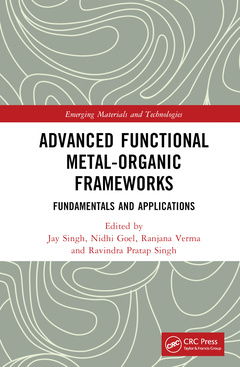Advanced Functional Metal-Organic Frameworks Fundamentals and Applications Emerging Materials and Technologies Series
Coordonnateurs : Singh Jay, Goel Nidhi, Verma Ranjana, Pratap Singh Ravindra

Due to the structural flexibility, large surface area, tailorable pore size and functional tenability, metal-organic frameworks (MOFs) can lead to materials with unique properties. This book covers the fundamental aspects of MOFs, their synthesis and modification, including their potential applications in different domains. The major focus is on applications including chemical, biosensors, catalysis, drug delivery, supercapacitors, energy storage, magnetics and their future perspectives.
The volume:
- Covers all aspects related to metal-organic frameworks (MOFs), including characterization, modification, applications and associated challenges
- Illustrates designing and synthetic strategies for MOFs
- Describes MOFs for gas adsorption, separation and purification, and their role in heterogeneous catalysis
- Covers sensing of different types of noxious substances in the aqueous environment
- Includes concepts of molecular magnetism, tunable magnetic properties and future aspects
This book is aimed at graduate students, and researchers in material science, coordination and industrial chemistry, chemical and environmental engineering and clean technologies.
1. Overview: What are Metal-Organic Frameworks?. 2. Methods for the Preparation of Metal-Organic Frameworks. 3. Properties and Factors Affecting the Preparation of Metal-Organic Frameworks. 4. Promising Functional Metal-Organic Frameworks for Gas Adsorption, Separation and Purification. 5. Metal-Organic Frameworks in Heterogeneous Catalysis. 6. Metal-Organic Frameworks as Chemical Sensors for Detection of Environmental Pollutants. 7. Recent Advancements in Metal-Organic Frameworks for Drug Delivery. 8. Metal-Organic Frameworks for the Development of Biosensors. 9. Potentiality of Magnetic Metal-Organic Frameworks. 10. Utility of Metal-Organic Frameworks in an Electrochemical Charge Storage. 11. Potential Redox Functions for Catalytic Hybrid Materials of Dimensional Cyanide-Bridged MOFs and Laccase Protein. 12. Metal-Organic Framework-Based Electrochemical Immunosensors for Virus Detection. 13. Future Challenges and Opportunities in the Field of Metal-Organic Frameworks.
Dr Jay Singh is currently working as an assistant professor at the Department of Chemistry, Institute of Sciences, Banaras Hindu University, Varanasi, Uttar Pradesh, since 2017. He received his PhD degree in polymer science from Motilal Nehru National Institute of Technology in 2010 and did MSc and BSc from Allahabad University, Uttar Pradesh, India. He had a postdoctoral fellow at National Physical Laboratory, New Delhi, Chonbuk National University, South Korea and Delhi Technological University, Delhi. Dr. Jay has received many prestigious fellowships like CSIR (RA), DST-Young Scientist fellowship, DST-INSPIRE faculty award etc. He is actively engaged in the development of nanomaterials (CeO2, NiO, rare-earth metal oxide, Ni, Nife2O4, Cu2O, Graphene, RGO etc.), based nanobiocomposite, conducting polymer and self-assembled monolayers based clinically important biosensors for estimation of bioanalaytes such as cholesterol, xanthine, glucose, pathogens and pesticides/toxins using DNA and antibodies. Dr. Jay has published more than 80 international research papers with total citations more than 3,600 and an h-index being 34. He has completed/running various research projects in different funding agencies. He has many edited/authored books (under pipeline) and has authored more than 10 book chapters of internationally reputed press for publications, namely Elsevier, Springer Nature, IOP, Wiley and CRC. He is actively engaged in fabricating metal oxide-based biosensors for clinical diagnosis, food packaging applications, drug delivery, and tissue engineering applications. His research has contributed significantly toward the fundamental understanding of interfacial charge transfer processes and sensing aspects of metal nanoparticles.
Dr Nidhi Goel received her doctorate in chemistry, Indian Institute of Technology Roorkee, India. After postdoctoral research (Young Scientist) from the Indian Institute of Science Bangalore, Karn
Date de parution : 05-2023
15.6x23.4 cm
Thèmes d’Advanced Functional Metal-Organic Frameworks :
Mots-clés :
Gas Absorption; Separation and Purification; Pollutants; Drug Delivery; Biosensors; Magnetic MOF; Electrochemical Storage; MOFs; BDC; MOF Synthesis; MOF Structure; Zeolitic Imidazolate Frameworks; Open Metal Sites; Secondary Building Units; American Chemical Society; MOF Material; Solvothermal Method; Stern Volmer Plot; Post-synthetic Modifications; Organic Linker Molecule; Zinc Nitrate Hexahydrate; SIBs; Hybrid MOFs; HKUST; Energy Density; HBV DNA; Cyanide Metal Complexes; Electrochemical Capacitors; EC Immunosensors; Bimetallic Assemblies; Electrochemical Performance; Adsorption Desorption Curve



